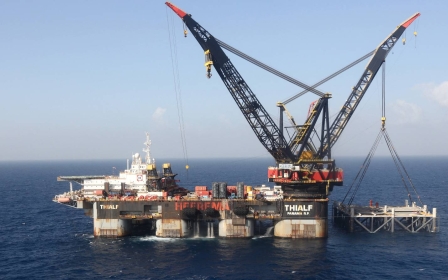Lebanon has US 'guarantees' on maritime deal - even if Netanyahu wants to sabotage it

Lebanon has secured "American guarantees" that its maritime border deal with Israel cannot be easily scrapped should Benjamin Netanyahu return to the Israeli prime minister's office, Beirut's chief negotiator said on Wednesday.
Israel and Lebanon struck a US-brokered sea border agreement last month that opens up potentially lucrative offshore gas fields.
New MEE newsletter: Jerusalem Dispatch
Sign up to get the latest insights and analysis on Israel-Palestine, alongside Turkey Unpacked and other MEE newsletters
The agreement was seen as a rare diplomatic breakthrough between two neighbours who are still technically in a state of war. It was reached at a time of renewed interest in Eastern Mediterranean energy, with European states scrambling for alternative gas suppliers following Russia's invasion of Ukraine.
But the deal’s fate has been thrown into doubt with Netanyahu appearing to be on the cusp of returning to power. The former Israeli prime minister has dismissed the agreement as an "illegal ploy", and vowed, in an interview with Israel's Army Radio on Monday, to "neutralise" it.
The deal was reached with the support of Lebanon's Iran-backed Hezbollah. Analysts said the Mediterranean country's economic crises served as an impetus to bring Lebanon's disparate political factions together and negotiate with Israel.
'Sufficient guarantees'
"We obtained sufficient American guarantees that this deal cannot easily be cancelled," said Lebanon's negotiator, Elias Bou Saab, who is also deputy parliament speaker.
If Netanyahu wants to withdraw from the deal, then "he will withdraw from an agreement with the US", Bou Saab told AFP, noting that Israel and Lebanon had signed separate deals with the United States.
He said Washington had warned that "the withdrawal of any party would have great consequences on both countries".
"When Netanyahu says that he wants to withdraw, this means that he will be facing the international community," Bou Saab added.
Lebanon's politicians have hoped that tapping the country's energy reserves will help mitigate what the World Bank says is one of the worst economic crises in history, however, energy analysts have warned that Lebanon is still years away from being able to monetise its gas deposits.
Israel, meanwhile, has increased gas exports and is ready to begin pumping more gas from the Karish gas field - which fell in the zone of dispute with Lebanon.
Netanyahu, who has called the deal a "capitulation agreement", has not commented on it since Tuesday's Israeli elections.
Initial poll results show Netanyahu and his far-right allies taking a narrow lead with 90 percent of the votes counted on Wednesday.
US President Joe Biden had hailed the "historic" deal, which comes as Western powers clamour to open up new energy production and reduce vulnerability to supply cuts from Russia.
Middle East Eye delivers independent and unrivalled coverage and analysis of the Middle East, North Africa and beyond. To learn more about republishing this content and the associated fees, please fill out this form. More about MEE can be found here.





